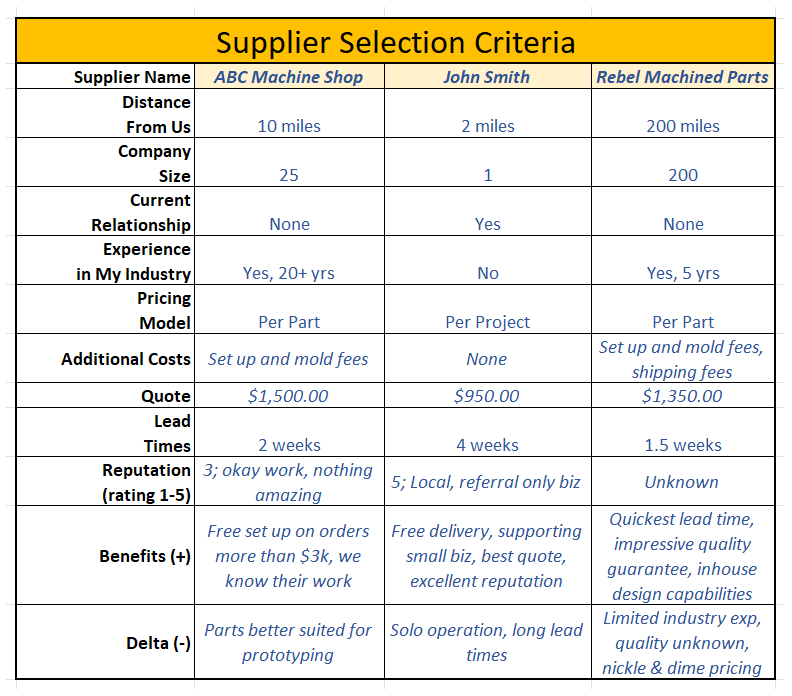|
We’ve had an unprecedented amount of commentary and feedback on the original article published in early 2018 covering ‘Picking the Right Supplier’. Given the current economic and supply chain challenges facing many businesses in 2022 we’ve updated the article to reflect today’s business needs in an ever-changing marketplace. When you need help in your business how do you figure out where to go to find it? Just as important, how do you make sure the help you select is the right one for the job? The supplier selection process (finding and picking your help) is an important and vital step for any size company. Making the wrong decision can lead to countless hours of wasted time and of course money down the drain. To find the right supplier, a ‘supplier selection process’ is important to develop ahead of time, especially for small and start-up based business where decisions can have a larger impact on the state of the business. When looking for a new supplier follow these steps to best position yourself and company for success in picking the right relationship for your business: 1. Know What You Need Before You Need It Two reasons this is important: 1st – if you don’t know what you need how will you be able to explain it to a supplier? If you can’t explain it how will they understand what you need to then be able to successfully deliver on your behalf? When we know what we need, and therefore want, we're better prepared to explain those needs while setting expectations for what a successful partnership looks like. This minimizes miscommunication and opportunity for expectations to fall through. 2nd - Waiting till the last minute to find suppliers often leads to decisions being made which may get you out of a momentary jam but leads to larger problems down the road. For this reason it’s vital you are proactive in establishing relationships with vendors and suppliers before you actually need their help. 2. Finding A Supplier Referrals, referrals, referrals! Once you know what you need the best approach to finding the right supplier is by reaching out to others in your industry, or local industry associations, to learn who they use, and just as important who they don’t use. Take the time to read reviews, gather intel from people you trust before you start calling potential suppliers. While sites like Thomasnet and Google can provide this information it is likely you will quickly find yourself overwhelmed with information. In the end the most useful data is those that are unbiased or comes from experience which is best collected from trusted resources. Me personally, I would rather work with someone I know, or with someone a close source to me knows, rather than cross my fingers and hope for the best by using an online search. As stated in #1, do the leg work to find suppliers proactively before you actually need it! 3. Be A Detective, Collect Useful Information It's vital you vet all potential suppliers with the same list of needs, criteria, and expectations this way you can compare each supplier and what they bring to the table. This will help to create an even playing field when looking at a supplier’s capabilities, offering and of course pricing. Below shows an example of what a ‘Supplier Selection Criteria' may look like. Using this type of tool allows you to collect similar information while comparing against other options. It’s important to remove emotion from this process while sticking to facts. Remember – each situation may be different. There may be a time you need something quickly, in this situation ‘quick response’ usually translates to higher cost. Maybe location of your supplier or their experience in your industry is important. Each situation is different and should be viewed as so in order for you to determine what supplier is best fit for your needs. 4. Strategic Thinking & Economies of Scale Once you know what you need from a supplier it’s important to think about other associated or cross functional activities which need to be done that could be accomplished by a single supplier. The ideal situation is you find a supplier that can do more than just one component of your needs, therefore providing more value in the long run. This also saves time because you have less suppliers and vendors to managed increasing your efficiency and effectiveness. Lastly, its not uncommon when you have one supplier doing several things for you to experience a price break as a result. The flip side may also be true – if you have one supplier dominating a particular part of your business that can also be a risk point as well. Balance is key here while consistently reviewing your relationships, needs and financial output annually. 5. Proactively Learn About Your Suppliers Behaviors When speaking with a potential new supplier try connecting with the people you will be working with, not just the company’s salesperson. This is important because once the relationship is established most of your time won’t typically be spent with their salespeople rather those delivering the service or product. When courting a supplier pay attention to things like:
6. Economics & Supply Chain Simply put - can your supplier withstand a downturn in the economy? Do they have a strategy in place for dealing with supply chain issues? I love working with small companies because I think it’s important to support small businesses, however I do often think about their ability to weather the storm from a business continuity perspective. Regardless of the size of the supplier, what is more important is can they continue to meet your needs even when times get tough. If they are a critical supplier to your business it’s worth spending time to learn about this proactively as you don’t want to find yourself in a situation where the economy takes a digger causing your supplier to go belly up or unable to meet its commitments. Your supplier’s inability to manage their business may just leaving you high and dry, in the process causing you to have your own business continuity issues. In the end, the supplier selection process should ideally come down to three things, in ranked order: 1. Performance 2. Relationship 3. Price At the end of the day it doesn’t matter how affordable or cost effective a supplier is, or how nice they are as people. If they can’t perform, and do so consistently, the other two ultimately don’t matter. I’ve also found that paying a bit more for the right service and relationship often is worth the investment it in the long run despite the extra cost up front. As Benjamin Franklin is quote as saying, “The bitterness of poor quality remains long after the sweetness of low price is forgotten.”
0 Comments
Executive Summary: Developing a strategic and consistent process to evaluate and therefore acquire suppliers before you need them is vital to our ability in growing our company. When we utilize a systematic process we eliminate bias and emotion from the decision making process which allows us to make decisions which are capabilities and needs based rather than emotions. Your ‘minimum expectations’ list serves as a road map for decision making and comparison shopping as you engage with each supplier. Author: Travis Smith Read the full article by downloading the below PDF attachment
About the AuthorTravis Smith is the founder and managing director of Square-1 Engineering, a medical device consulting firm, providing end to end engineering and compliance services. He successfully served the life sciences marketplace in SoCal for over 15 years and has been recognized as a ‘40 Under 40’ honoree by the Greater Irvine Chamber of Commerce as a top leader in Orange County, CA. Categories
All
Archives
July 2024
|
||||||
Visit Square-1's
|
|




 RSS Feed
RSS Feed


